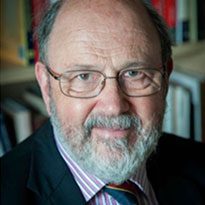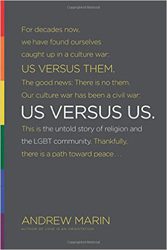
N. T. Wright’s magisterial text Paul and the Faithfulness of God is destined to become a classic in Pauline theological studies. As a pastor and theologian, like Wright, I join the study and the pulpit and the library and hospital room. My preaching and pastoral care are grounded in theological reflection and my theology finds its inspiration in pastoral care, spiritual direction, and the weekly responsibilities of preaching God’s good news and leading a congregation on Cape Cod. I have always appreciated Paul’s approach to ministry – he proclaimed the universally applicable wisdom of God embodied in Jesus Christ with full awareness of the intimate needs of the communities with which he corresponded. The universal truths of faith become transformational only when they connect with the real challenges of congregations, communities, and persons.
Paul is a working pastor-theologian, and I can identify with that joyful-challenging vocation. His theology is holistic, practical, and connected with what’s going on in the faith of emerging Christian communities. He doesn’t speak to Christians in general; he speaks to the faithful church in Philippi, the ethnically troubled churches in Galatia, and the divided congregation in Corinth. Still, precisely because his theology is embodied and emerges from the concrete world of budgets and communication gaffes, it echoes through the ages, bringing challenge and good news to twenty-first century believers and seekers.
N. T. Wright sees the heart of Paul’s theology as involving his experience and expression of God’s new creation, brought about by God’s action in Jesus Christ, crucified and risen. Although Christ as Messiah is profoundly Jewish – you cannot find any foundation for anti-Judaism in the authentic Pauline literature – he sees Jesus Christ as embodying and inviting us to live in God’s new age of Shalom. Accordingly, Pauline theology is profoundly concrete. He is a preacher-theologian: his thinking is ultimately practical. Paul believes that the theological is transformational. The message of the Gospel and God’s new creation, the heart of Paul’s message, is transformational and invites us to become transformed persons, living in transformed communities, and working toward a transformed world order. Many scholars of John’s Gospel note a similar holistic approach to John’s theology: John’s proclamation of eternal life is not just some future hope, the “pie in the sky when we die,” but a present experience that emerges the moment we enter into relationship with Jesus Christ, the word and wisdom of God.
Theology is homiletical and can be healing, for Paul. The theologian-preacher does not abandon history, but imagines, as Wright asserts, a better history and then works to bring it forth. The life, death, and resurrection of Jesus Christ brings about new creation in the here and now and the spirit of Jewish monotheism, this new creation is cosmological, ethical, and soteriological – we are new people, experiencing a transformed universe, touched by the healing Christ, and living by the values of God’s realm “on earth as it is in heaven.” Our vision of God’s faithfulness throughout history and in all creation nurtures the confidence that transforms behavior and beliefs.
As the body of Christ, the church is always more than we can imagine. Paul’s letters to emerging congregations are invitations to live in God’s realm of Shalom right now. As a holistic theologian, Paul sees the body, mind, spirit relationship as both a metaphor and a reality for community life. Disease among the members – like cells run amuck – can destroy the community, and render it insentient to God’s vision. Every part matters, every member is inspired (in-breathed) and touched by the mind-spirit of Christ, which is not some supernatural add-on, but the animating and guiding principle of part and whole. Dynamic in nature, the lively, inspired body of Christ can become God’s embodied vision of Shalom – of new creation – in this very moment of time. Accordingly, when Paul encounters the tragic brokenness of Christ’s body, he experiences what Abraham Joshua Heschel describes as the “divine pathos,” the intimate joy and suffering God experiences in relationship to our world. What happens in Corinth, including the details of agape meals and worship services, matters to God because God is in the details: God is touched by church divisions, arguments among members, economic disparity, and ethnic prejudice.
God is truly in Christ reconciling the world, and we are intended to be companions in God’s ministry of reconciliation. We are intended to be a microcosm, a foretaste, of the world to come, participating in God’s new creation and becoming God’s temple making sacred the world. As pastor-theologians, Paul and I share the hope for new creation in the congregations we serve; we also experience the dissonance between our concrete embodiment of God’s new creation and God’s vision of what we as pastors and our congregations can be in God’s ever-present, ever-future new creation. We expect far too little from God and far too little from ourselves. We are the body of Christ and individually reflections of divine wisdom, yet we settle for so much less – petty prejudices, alienation over budget items, neglect of vulnerable members, and conforming to a social order that is ruled by consumerism, narcissism, and polarization. We are too often, Paul says in Romans, conformed to this world, when God calls us to transformation – first, of ourselves, but also of transformed communities without which personal transformation is almost impossible.
Still in our imperfection and waywardness, we can experience God’s transformation. We feel, as Paul did, “wretched” and pray that something will deliver us from the conflicts and weakness that beset us. We can’t do it on our own. Faithful communities, inspired and animated by a faithful God, are essential. But, more than that, it involves trusting a faithful God of new creation, whose love still encompasses Judaism, but now extends in space and time reconciling all history, and making this moment a holy moment. Only the faithful God can give us the energy of transformation that enables us to make a commitment to reconciling people, living God’s new creation. The new creation is here – or nowhere – transforming the past and luring us to live in God’s future now!
Theology is pastoral, homiletical, spiritual, and theological. God is found in worship, but also in potluck suppers, daily decision-making, and brick and mortar. It is all the prayer of God’s spirit groaning in creation and in us in “sighs too deep for words.
It is only right that the final page of Wright’s grand opus affirms, “Prayer and theology met in his personal history, as in the once-for-all history of the crucified and risen Messiah. Paul’s ‘aims’, his apostolic vocation, modeled the faithfulness of God. Concentrated and gathered. Prayer became theology, theology prayer. Something understood.”
To read an excerpt from Paul and the Faithfulness of God, visit the Patheos Book Club here.

















